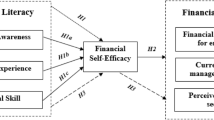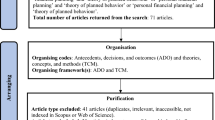Abstract
Derived from Marcia’s (1966) identity statuses, we examine how financial identity statuses (achievement, moratorium, foreclosure, diffusion; Barber et al. (2011); Bosch et al. (2016); Sorgente et al. (2020)) relate to the preparation for taking on financial responsibilities, materialism, compulsive buying, responsible credit management, and financial anxiety and financial well-being among university students taking a Consumer Economics course. Key findings included: (1) Identity achievement was related positively to preparation for taking on financial responsibilities; (2) Identity moratorium was related positively to financial anxiety and related negatively to financial well-being; and (3) Identity diffusion was related negatively to preparation for taking on financial responsibilities and responsible credit management and related positively to materialism and compulsive buying. Findings suggest a combination of helping emerging adults become less financially dependent on parents and greater financial socialization may help them develop financial identity achievement.

Similar content being viewed by others
Data Availability
Data used in the current study are available from the corresponding author upon reasonable request.
Notes
The Proposed Saturated Model has been provided as Supplemental Fig. 1 in the Appendix. In this proposed model, we explored the pathways between the socialization/control variables and all other variables in the model. We also explored all pathways between the financial identity statutes, financial attitudes, and the financial behaviors and financial well-being outcomes (financial anxiety and financial well-being).
References
Achtziger, A., Hubert, M., Kenning, P., Raab, G., & Reisch, L. (2015). Debt out of control: The links between self-control, compulsive buying, and real debts. Journal of Economic Psychology, 49, 141–149. https://doi.org/10.1016/j.joep.2015.04.003
Archuleta, K. L., Dale, A., & Spann, S. M. (2013). College students and financial distress: Exploring debt, financial satisfaction, and financial anxiety. Journal of Financial Counseling and Planning, 24(2), 50–62.
Archuleta, K. L., Mielitz, K. S., Jayne, D., & Le, V. (2020). Financial goal setting, financial anxiety, and solution-focused financial therapy (SFFT): A quasi-experimental outcome study. Contemporary Family Therapy, 42(1), 69–76. https://doi.org/10.1007/s10591-019-09501-0
Arnett, J. J. (2000). Emerging adulthood: A theory of development from the late teens through the twenties. American Psychologist, 55(5), 469–480. https://doi.org/10.1037//0003-066X.55.5.469
Atalay, A. S., & Meloy, M. G. (2011). Retail therapy: A strategic effort to improve mood. Psychology & Marketing, 28, 638–660. https://doi.org/10.1002/mar
Barber, B., Card, N., Serido, J., & Shim, S. (2011). Financial identity of U.S. and Australian college students. Poster presentation given at the annual meeting of the National Council of Family Relations. Orlando.
Bosch, L. A., Serido, J., Card, N. A., Shim, S., & Barber, B. (2016). Predictors of financial identity development in emerging adulthood. Emerging Adulthood, 4(6), 417–426. https://doi.org/10.1177/2167696816631845
Butterbaugh, S. M., Ross, D. B., & Campbell, A. (2020). My money and me: Attaining financial independence in emerging adulthood through a conceptual model of identity capital theory. Contemporary Family Therapy, 42, 33–45. https://doi.org/10.1007/s10591-019-09515-8
Carroll, J. S. (2004). The Comprehensive Marriage Preparation ASessment Survey (COMPASS). Persona LLC.
Consumer Financial Protection Bureau (CFPB). (2015). Measuring financial well-being: A guide to using the CFPB financial well-being scale. Consumer Financial Protection Bureau. Retrieved from https://files.consumerfinance.gov/f/201512_cfpb_financial-well-being-user-guide-scale.pdf
Consumer Financial Protection Bureau (CFPB). (2017). CFPB financial well-being scale: Scale development technical report. Consumer Financial Protection Bureau. Retrieved from https://files.consumerfinance.gov/f/documents/201705_cfpb_financial-well-being-scale-technical-report.pdf
Consumer Financial Protection Bureau (CFPB). (2018). Pathways to financial well-being: The role of financial capability. Consumer Financial Protection Bureau. Retrieved from https://files.consumerfinance.gov/f/documents/bcfp_financial-well-being_pathways-role-financial-capability_research-brief.pdf
Cote, J. (1997). An empirical test of the identity capital model. Journal of Adolescence, 20(5), 577–597. https://doi.org/10.1006/jado.1997.0111
Cote, J. E. (2000). Arrested adulthood: The changing nature of maturity and identity. New York University Press.
Crocetti, E. (2018). Identity dynamics in adolescence: Processes, antecedents, and consequences. European Journal of Developmental Psychology, 15(1), 11–23. https://doi.org/10.1080/17405629.2017.1405578
Danes, S. M. (1994). Parental perceptions of children’s financial socialization. Journal of Financial Counseling and Planning, 5, 127–149.
Dew, J. P., & Xiao, J. J. (2011). The financial management behavior scale: Development and validation. Journal of Financial Counseling and Planning, 22(1), 43–59.
Ehrbar, N. (2019, May 17). More than half of millennials in their 30s still banking on mom and dad. Yahoo! Finance. Retrieved from https://finance.yahoo.com/news/more-than-half-of-millennials-banking-on-mom-and-dad-192804570.html?guccounter=1
Erikson, E. (1950). Childhood and society. Norton.
Erikson, E. (1968). Identity: Youth and crisis. Norton.
Faber, R. J., & O’Guinn, T. C. (1992). A clinical screener for compulsive buying. Journal of Consumer Research, 19(3), 459–469.
Garon, T., Dunn, A., Golvala, K., & Wilson, E. (2018). U.S. financial health pulse: 2018 baseline survey results. Center for Financial Services Innovation.
Gudmunson, C. G., & Danes, S. M. (2011). Family financial socialization: Theory and critical review. Journal of Family and Economic Issues, 32, 644–667. https://doi.org/10.1007/s10834-011-9275-y
Harzog, B. (2020, Sept 8). Survey: Majority of parents want high schools to teach personal finance. Yahoo! Finance. Retrieved from https://finance.yahoo.com/news/survey-majority-parents-want-high-140207852.html
Hu, L. T., & Bentler, P. M. (1999). Cutoff criteria for fit indexes in covariance structure analysis: Conventional criteria versus new alternatives. Structural Equation Modeling, 6, 1–55. https://doi.org/10.1080/10705519909540118
Jorgensen, B. L. (2007). Financial literacy of college students: Parental and peer influences [Unpublished Masters Thesis]. The Virginia Polytechnic Institute and State University. Retrieved from https://vtechworks.lib.vt.edu/bitstream/handle/10919/35407/Thesis_BJ2.pdf?sequence=1&isAllowed=y
Jorgensen, B. L., Foster, D., Jensen, J. F., & Vieira, E. (2016). Financial attitudes and responsible spending behavior of emerging adults: Does geographic location matter? Journal of Family and Economic Issues, 38(1), 70–83. https://doi.org/10.1007/s10834-016-9512-5
Jorgensen, B. L., Rappleyea, D. L., Schweichler, J. T., Fang, X., & Moran, M. E. (2017). The financial behavior of emerging adults: A family financial socialization approach. Journal of Family and Economic Issues, 38, 57–69. https://doi.org/10.1007/s10834-015-9481-0
Kins, E., & Beyers, W. (2010). Failure to launch, failure to achieve criteria for adulthood? Journal of Adolescent Research, 5, 743–777.
Ksendzova, M., Donnelly, G. E., & Howell, R. T. (2017). A brief money management scale and its associations with personality, financial health, and hypothetical debt repayment. Journal of Financial Counseling and Planning, 28, 62–75. https://doi.org/10.1891/1052-3073.28.1.62
LeBaron, A. B., Holmes, E. K., Jorgensen, B. L., & Bean, R. A. (2020). Parental financial education during childhood and financial behaviors of emerging adults. Journal of Financial Counseling and Planning, 31(1), 42–54. https://doi.org/10.1891/JFCP-18-00021
LeBaron, A. B., & Kelley, H. (2021). Financial socialization: A decade in review. Journal of Family and Economic Issues, 42(1), 195–206. https://doi.org/10.1007/s10834-020-09736-2
LeBaron, A. B., Rosa-Holyoak, C. M., Bryce, L. A., Hill, E. J., & Marks, L. D. (2018). Teaching children about money: Prospective parenting ideas from undergraduate students. Journal of Financial Counseling and Planning, 29(2), 259–271. https://doi.org/10.1891/1052-3073.29.2.259
LeBaron, A. B., Runyan, S. D., Jorgensen, B. L., Marks, L. D., Li, X., & Hill, E. J. (2019). Practice makes perfect: Experiential learning as a method for financial socialization. Journal of Family Issues, 40(4), 435–463. https://doi.org/10.1177/0192513X18812917
Lowe, S. R., Dillon, C. O., Rhodes, J. E., & Zwiebach, L. (2013). Defining adult experiences: Perspectives of a diverse sample of emerging adults. Journal of Adolescent Research, 28(1), 31–68. https://doi.org/10.1177/0743558411435854
Marcia, K. E. (1966). Development and validation of ego identity status. Journal of Personality and Social Psychology, 3(5), 551–558.
Muthen, L. K., & Muthen, B. O. (2011). Mplus user’s guide (6th ed.). Muthen & Muthen.
Nelson, L. J., & Barry, C. M. (2005). Distinguishing features of emerging adulthood: The role of self-classification as an adult. Journal of Adolescent Research, 20(2), 242–262.
Next Gen Personal Finance. (2022, Nov 17). Updated (11/17/2022): How many states require students to take a personal finance course before graduating from high school? Is it 17 or 21? Retrieved from https://www.ngpf.org/blog/advocacy/how-many-states-require-students-to-take-a-personal-finance-course-before-graduating-from-high-school-is-it-6-or-is-it-21/#:~:text=UPDATED%20(7%2F14%2F22,*Florida%20(2027)
Padilla-Walker, L., Nelson, L., & Carroll, J. (2012). Affording emerging adulthood: Parental financial assistance of their college-aged children. Journal of Adult Development, 19(1), 50–58. https://doi.org/10.1007/s10804-011-9134-y
Parotta, J. L., & Johnson, P. J. (1998). The impact of financial attitudes and knowledge on financial management and satisfaction of recently married individuals. Journal of Financial Counseling and Planning, 9(2), 58–75.
Preacher, K. J., & Hayes, A. (2008). Asymptotic and resampling strategies for assessing and comparing indirect effects in multiple mediator models. Behavior Research Methods, 40, 879–891. https://doi.org/10.3758/BRM.40.3.879
Romo, L. K. (2011). Money talks: Revealing and concealing financial information in families. Journal of Family Communication, 11, 264–281. https://doi.org/10.1080/15267431.2010.544634
Rook, D. W., & Fisher, R. J. (1995). Normative influences on impulsive buying behavior. Journal of Consumer Research, 22, 305–313. https://doi.org/10.1086/209452
Serido, J., Sorgente, A., Lanz, M., & Shim, S. (2022). Becoming self-sufficient: A longitudinal person-centered analysis of financial identity and adult status during emerging adulthood. Applied Developmental Science. https://doi.org/10.1080/10888691.2022.2035224
Shim, S., Serido, J., Bosch, L., & Tang, C. (2013). Financial identity-processing styles among emerging adults: A longitudinal study of socialization factors and consequences for financial capabilities. The Journal of Consumer Affairs, 47(1), 128–152. https://doi.org/10.1111/joca.12002
T Rowe Price. (2015). 7th annual parents, kids & money survey. Retrieved from http://corporate.troweprice.com/Money-Confident-Kids/images/emk/2015-PKM-Report-2015-FINAL.pdf
T Rowe Price. (2022, April 5). T. Rowe Price: Families’ excitement for cryptocurrency brings risks and opportunities. Retrieved from https://www.troweprice.com/content/dam/trowecorp/Press%20Release%20-%20PKM22_release_FINAL%2004052022.pdf
Sorgente, A., Vosylis, R., Lanz, M., Serido, J., & Shim, S. (2020). The financial identity scale (FIS): A multinational validation and measurement invariance study among emerging adults. International Journal of Behavioral Development, 44(6), 565–574. https://doi.org/10.1177/0165025420914986
Van Ornum, W., Dunlap, L. L., & Shore, M. F. (2008). Psychological testing across the life span. Pearson, Education Inc.
Vosylis, R., & Erentaite, R. (2020). Linking family financial socialization with financial capabilities: Which dimensions matter most for financial identity, behaviors, and anxiety? Emerging Adulthood, 8(6), 464–475. https://doi.org/10.1177/2167696819856763
Yorgason, J. B., James, S. L., & Holmes, E. K. (2018). Couple relationships and transition experiences (CREATE) codebook (wave 1). School of Family Life, Brigham Young University.
Funding
No funding was received for this study.
Author information
Authors and Affiliations
Contributions
Both authors contributed to the writing and editing of the manuscript; The first author conducted the data collection and data analyses.
Corresponding author
Ethics declarations
Conflict of interest
The authors have no relevant financial or non-financial conflicts of interests to disclose.
Ethical Approval
All procedures performed in studies involving human participants were in accordance with the ethical standards of the institutional and/or national research committee and with the 1964 Helsinki declaration and its later amendments are comparable ethical standards. This article does not contain any studies with animals performed by any of the authors.
Informed Consent
Data were originally collected as in-class assignments for internal evaluation purposes. The first author obtained retroactive IRB approval (exempt status) to use this data for research purposes (IRB-21-162). All participants’ identifying information was removed before analyses began.
Additional information
Publisher's Note
Springer Nature remains neutral with regard to jurisdictional claims in published maps and institutional affiliations.
Supplementary Information
Below is the link to the electronic supplementary material.
Rights and permissions
Springer Nature or its licensor (e.g. a society or other partner) holds exclusive rights to this article under a publishing agreement with the author(s) or other rightsholder(s); author self-archiving of the accepted manuscript version of this article is solely governed by the terms of such publishing agreement and applicable law.
About this article
Cite this article
Wheeler, B.E., Brooks, C. Financial Socialization, Financial Identity, and Financial Well-Being Among University Students Taking a Consumer Economics Course. J Fam Econ Iss (2023). https://doi.org/10.1007/s10834-023-09930-y
Accepted:
Published:
DOI: https://doi.org/10.1007/s10834-023-09930-y




